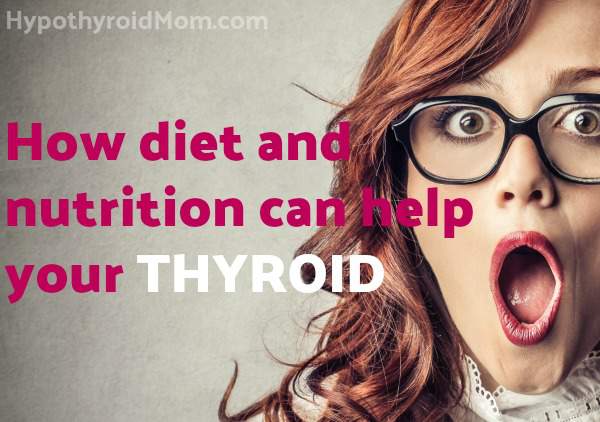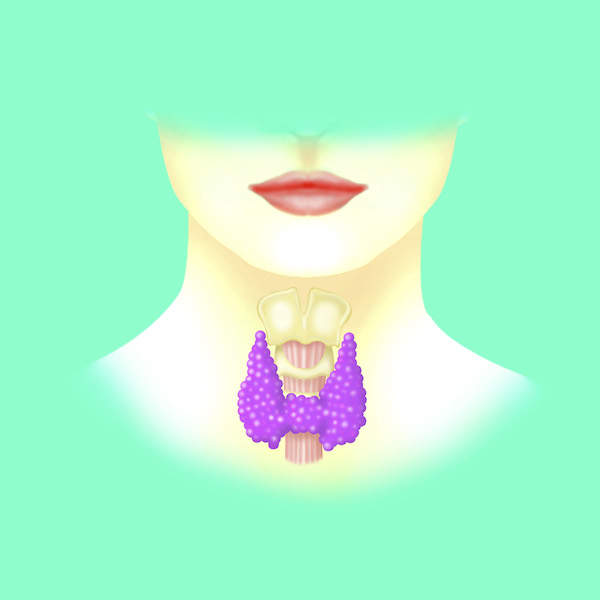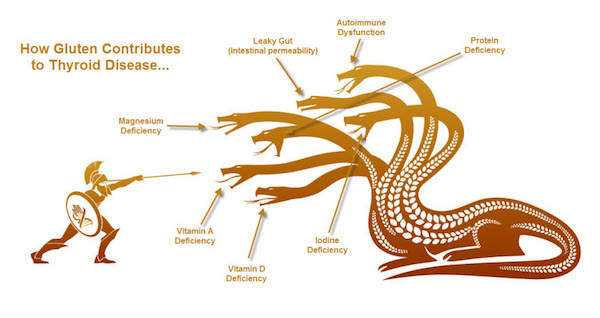
A doctor will run the lab test TSH (thyroid stimulating hormone). If TSH is above the “normal” range, the person is diagnosed with hypothyroidism. “Normal” is far from normal for many thyroid patients, but that’s another story and you can read more about that here. Out comes the prescription pad to write a prescription for thyroid hormone replacement medication. All too often the patient fails to feel better and sometimes even feels worse than before. There starts a lifelong journey with doctors chasing the patient’s symptoms prescribing one after another of different medications all while the patient continues to struggle. There is zero investigation into the WHY of hypothyroidism in too many cases.
WHY? This is a common sense question in the case of most diseases, yet for some strange reason it is completely overlooked when it comes to thyroid disease.
WHY do YOU have hypothyroidism?
Isn’t that an important question?
Written by Dr. Peter Osborne
What is the thyroid?

The thyroid is a butterfly-shaped gland in your neck. One of its primary functions is to pump out a hormone called thyroxine, T4. It’s that hormone that sets the metabolic pace of the body. It’s what regulates energy production. Some of the most common symptoms of inadequate thyroid hormone include fatigue, bloating, hair loss, dry skin, joint pain, muscle stiffness, elevated cholesterol, sleep disruption, infertility, depression, cold hands and feet, and weight gain. While gaining weight is a textbook symptom of hypothyroidism, I’ve seen patients actually lose weight with hypothyroidism. In some cases part of their disease is that their gut is so broken down that they are malabsorbing nutrients and that’s why their thyroid is malfunctioning but they are losing weight. If we fall to these medical conceptions that every person with hypothyroidism must present with weight gain then we are going to miss a lot of people with thyroid problems.
Traditional diagnosis is made based on the lab test TSH (thyroid stimulating hormone) typically ordered by a general doctor, internist, or endocrinologist. One of the many problems with this approach is that it is not comprehensive. If your TSH comes back high, the doctor tends to diagnose you with hypothyroidism. Unfortunately, this approach often times leads to treatment with thyroid hormone replacement medication without further investigation. Keep in mind one fundamental point – Having a low thyroid diagnosis and taking thyroid medication does not fix the problem.
Ultimately, the goal of the doctor and patient should be to identify the reason the thyroid levels are abnormal. And this requires a fundamental knowledge of nutrition and biochemistry.
Let’s take a deeper look at some of the common things, from a diet and nutrition perspective, that can contribute to low thyroid hormone production:
- Gluten
- Sugar
- Goitrogenic foods
- Dairy
- Nutritional deficiencies
Gluten and your thyroid
Gluten sensitivity contributes to thyroid disease in a number of different ways. Gluten induced gastrointestinal damage is one of the main mechanisms of action. It is this mechanism that leads to a domino-like effect. The first step in this process is the creation of intestinal hyper-permeability (AKA – Leaky Gut). When the intestinal barrier is compromised, a cascade of inflammation, immune over-stimulation, and molecular mimicry can ensue. Over time these processes can cause an autoimmune thyroid reaction resulting in Hashimoto’s disease or Graves’ disease.

Gluten induced gastrointestinal damage can contribute to poor digestion and absorption of thyroid critical nutrients. Gluten can also alter normal gut bacteria. These bacteria play a crucial role in thyroid hormone conversion. Many doctors will argue that no research exists between gluten and thyroid disease. They are wrong. The image above is taken from a quick search in the National Library of Medicine database.
Where do we find gluten? Most people will say that wheat, barley and rye are the grains that contain gluten. In reality, however, there are different kinds of gluten and they are found in all the different forms of grain. In my experience helping thyroid patients recover their health, most of them need to be on a grain-free diet not a traditional gluten-free diet where they are only omitting wheat, barley and rye. If you’re reading this article and thinking you’re already on a gluten-free diet but you are eating rice, sorghum, corn, or pseudo grains like amaranth, quinoa and buckwheat and still struggling, try eliminating them and see how much better you feel.
Sugar
I’m talking about processed sugar – dextrose, glucose, fructose, maltodextrin, all the different forms of processed sugar, even organic processed sugars. Many of the food manufacturers have gotten wise about people wanting to avoid sugar so they’ve started saying it in different ways on food labels. For example organic sucanat is still processed sugar. Avoidance of processed sugar must be a priority.
Goitrogens
There are a number of foods that can suppress thyroid hormone production and contribute to goiter (thyroid enlargement). These are typically referred to as goitrogenic foods, because when eaten in large quantities, they can cause a goiter to form. The following is a list of foods that have these properties. Keep in mind that just because a food is goitrogenic doesn’t mean you cannot eat it. You can get in trouble if you eat excessive amounts of these foods, for example if you are doing a lot of juicing and using half a pound of cabbage each time and it’s raw and it hasn’t been cooked. If you’re eating cruciferous vegetables and you have a thyroid condition, my advice is don’t stop eating them just cook them well and don’t make them the primary staple foods in your diet. Cooking cruciferous vegetables reduces this goitrogenic effect by as much as 70-80%.
- Soy (avoid soy, especially GMO soy)
- Brussels Sprouts
- Bok choy
- Cabbage
- Cauliflower
- Collards
- Cassava
- Broccoli
- Kale
- Bamboo shoots
- Spinach
- Radishes
- Rutabaga
- Turnips
- Watercress
- Kohlrabi
- Mustard greens
- Flax
- Pine nuts
- Peanuts
Casein in dairy can mimic gluten
The protein casein in dairy can mimic gluten. Therefore, for those with gluten sensitivity, it may be the dairy in their diet that mimics gluten triggering the autoimmune response against the thyroid.
Gluten, sugar, goitrogenic foods, and dairy are the most common food-based triggers for thyroid hormone disruption.
Adequate nutrition is crucial for a healthy thyroid
Now let’s talk about a food element that is going to be helpful for the thyroid to function. There are some very important nutrients needed for thyroid function. Vitamins and minerals help drive the chemistry behind the production of the different thyroid hormones. They also help these hormones communicate with the DNA and other organs to improve and regulate metabolism.
As I mentioned before, often times doctors will only run one lab test known as TSH (thyroid stimulating hormone) for the diagnosis and treatment of thyroid disease. If TSH is above normal, you are diagnosed “hypothyroid”. If TSH is below normal, you are diagnosed “hyperthyroid”. Simple, right? No, far from it.
TSH is a regulatory hormone produced in the brain by the pituitary gland. TSH then travels from your brain to the thyroid gland in your neck and tells it to produce the thyroid hormone T4. TSH has to be made first. Let’s start there. What raw ingredients does your body need to make TSH? The number one ingredient is protein. I see a lot of people with thyroid hormone problems eating diets low in protein and high in carbs. How much is enough protein? For an average calculation, take your body weight in kilograms (whatever you weigh in pounds divide that by 2.2 to give you your weight in kilograms) and multiply that by 0.8 and that’s how many grams of protein you need per day. Another way to calculate this number is to multiply the number 0.36 by your weight in pounds. For a 150-pound woman, for example, that would be 54 grams of protein. This number is individual for each person and varies by the person’s level of physical activity. Speak to your doctor if you suffer from kidney dysfunction. What else does our body need to produce TSH? Magnesium, Vitamin B12, and zinc. Without adequate levels of these ingredients your body cannot produce TSH and you will have low thyroid function right off the bat.

Now lets talk about thyroxine, T4. T4 thyroid hormone is basically protein plus iodine. Protein is absolutely necessary to form the backbone of thyroid hormone (particularly the amino acid in protein called tyrosine). Think of T4 as a fancy sports car. The frame of the car is the protein and that is made of tyrosine. This fancy sports car needs special tires to let it go at high speeds. Each of the 4 tires represents a molecule of iodine. The “4” in T4 represents how many molecules of iodine are present. You need sufficient iodine for that sports car to run smoothly. Where do we get iodine in the form of food? We get iodine primarily from things found in the ocean, not from lakes, not from rivers. Seafood, kelp, and seaweed are good sources of iodine. Think of the thyroid gland as a car factory. Internally in your thyroid gland, your thyroid uses a ton of Vitamin C. Vitamin C is very important to add those iodine tires to that thyroid hormone. You also need Vitamin B2. There is something in your thyroid gland called a symporter which allows the uptake of iodine. When you eat iodine-rich foods and the iodine is absorbed into the bloodstream, it’s the symporter in the thyroid gland that allows the entry of iodine. The symporter requires B2 to function properly. The other nutrient needed to form the thyroid hormoneT4 is Vitamin B3. Therefore, to make thyroid hormone T4, you need Vitamin B3, Vitamin B2, Vitamin C, protein, and iodine.

Imagine the thyroid hormone T4 as that shiny new sports car. Imagine that it’s sitting in your driveway and you don’t have the key to drive it. T4 is inactive thyroid hormone (like the sports car that you can’t drive). Protein is responsible for carrying T4 through the blood stream to your tissues including your liver and muscle where it gets converted to active T3 thyroid hormone. Think of the proteins in your bloodstream that carry the T4 thyroid hormone as those big trucks you see on the highway transporting 20 new cars at the same time to different dealerships around the country. The inactive T4 thyroid hormone is being transported to the liver, muscle, and other tissues (imagine they are the dealerships that have the keys to turn on the cars) where they are converted to the active T3 hormone. There is a process called deiodinization, where the body takes that T4 thyroid hormone and removes one molecule of iodine to convert it to active T3 hormone. I know that doesn’t quite fit our car analogy since we can’t drive a car with 3 wheels but you get the idea. A lot of the conversion of T4 to T3 happens in the liver and that’s why a person with liver problems can also have thyroid problems because their liver is not good at converting T4 to T3. This conversion also happens in the muscle which is why people with muscle inflammation often have thyroid problems too. Which nutrient is required for this conversion? Selenium. You need selenium to remove that one molecule of iodine to convert T4 to T3 thyroid hormone. You also need iron for the conversion of T4 to T3.
It’s T3 we consider the active thyroid hormone. Each cell of the body has a nucleus which contains the DNA. On the nuclear membrane there are nuclear receptors that act like a key hole. T3 is the key which binds to those receptors on the nucleus and activates the genes which ramp up your metabolism. You need Vitamin A and Vitamin D to bind to your T3 to create a super key that fits the nuclear receptors and unlocks your DNA.

At the end, you need Omega-3 fatty acids around the membrane of the cells for the hormone to be received appropriately.
If you are missing even one of these nutrients, you will have some form of biochemical thyroid suppression. This looks different for different people. For example, some people have severe selenium deficiency where they are converting very little inactive T4 thyroid hormone to the active T3 hormone. Their doctor is prescribing a form of synthetic thyroxine T4 thyroid hormone (levothyroxine, Synthroid, etc.), but they can’t convert the T4 in thyroxine to the active T3. They feel worse being on the medication. I see other people with a genetic susceptibility for severe Vitamin B2 deficiency who can’t get iodine into their thyroid gland. If you have one of these nutrient deficiencies, you can correct them with foods rich in the nutrients and/or with supplements. However the first step is determining whether or not you have one or more of these deficiencies.
The following is a list of nutrients that your doctor should measure when evaluating your thyroid:
- Protein
- Magnesium
- Zinc
- Selenium
- Iodine
- Iron
- Vitamin C
- Vitamin B2
- Vitamin B3
- Vitamin D
- Vitamin A
- Vitamin B12
- Omega-3
If you don’t have your doctor testing for these nutrient deficiencies, you will never know WHY you have a thyroid problem.
About Dr. Peter Osborne
Dr. Peter Osborne is the clinical director of Town Center Wellness in Sugar Land, Texas. He is a doctor of chiropractic and a Board Certified Clinical Nutritionist. His clinical focus is the holistic natural treatment of chronic degenerative musculoskeletal diseases. He is an expert in the relationship that gluten sensitivity and food allergies play in chronic inflammation. He has helped thousands of patients recover from chronic painful conditions.
I’m either one of the people with Hashimoto’s and no antibodies, or my exposure to large amounts of fluoride as a child hurt my thyroid. I’ll never know which.
What are the nutrients that thyroxine cause to be defficient in
I live in Derry nh and need to find an endro that knows something other than text book i feel like crap evry single day dont sleep axhausted all the time which causes depression and anxiety just want to wake up and look forward to my day I have graves disease had it 13 years ago went into remission Nd came back 6 years later had to have radioactive iodine wish i never did😥😥😥😥
I LIVE IN Ohio and so far I cannot find a real doctor or at least one that can read a lab report they just don’t teach it in medical school. My wife has a high reverse T-3 and low T-3 . Tsh normal and T-4 normal. and all say the same thing her thyroid is fine. my zip code is 44035 or 30 miles from cleveland ,Ohio. I have been all over the internet and most are scams. Is there a chance there is an honest MD in Ohio?
I live in Pennsylvania and made an appointment at the Cleveland Clinic because of what I read on the internet about the Endocrinology Department and Doctors. The patients that responded to their experiences at the clinic is what made me decide to travel 4 hrs and stay overnight. My appointment is the first weekend in June. Pittsburgh is only 60 miles but trying to find an Endocrinologist isn’t easy. Hope you have had some luck. I’ve been dealing with a hypothyroid for 40 years and it is so refreshing to read articles that are similar to the one above. I have so many problems I feel that they all stem from my thyroid.